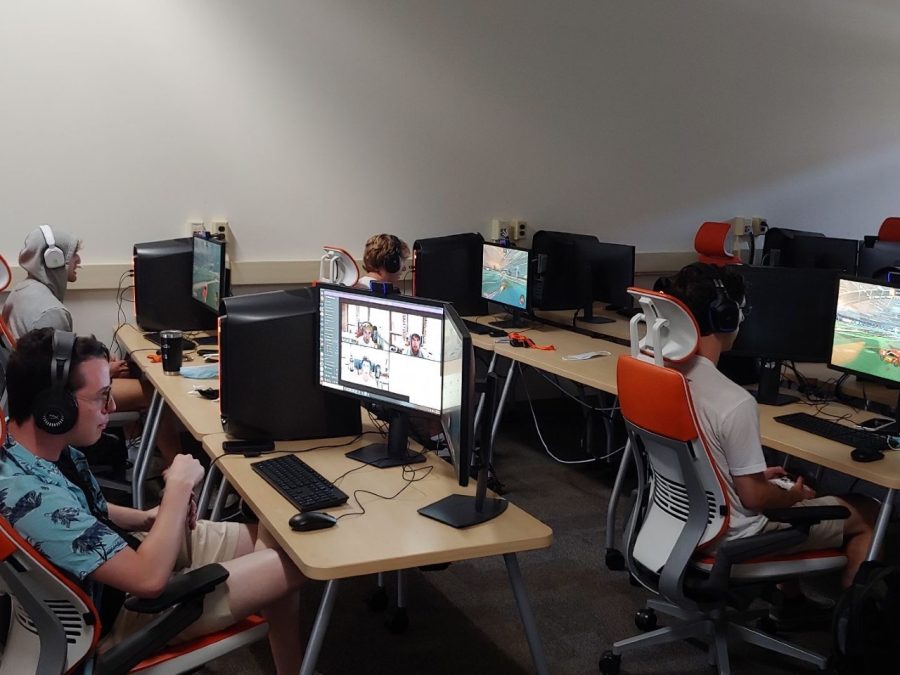Esports prospers on BGSU campus
BGSU esports gaming lab.
February 8, 2023
Bowling Green State University is one of many universities to have an esports team as its popularity rises.
Esports includes multiplayer online games played competitively. Over 170 colleges in the U.S. have an esports team, reported the National Association of Collegiate Esports.
The Bowling Green esports team competes in the Esports Collegiate Conference, which is affiliated with the Mid-American Conference that Bowling Green Athletics participates in.
The esports team at BGSU has grown not only in size but in popularity since the year it was introduced.
“There are over 622 people in our Discord server,” said Rocket League captain Zack Boyer, who is a junior on campus. “It has over 100 to 150 people actively competing on teams.”
Dylan Robinson, a sophomore at BGSU, and the Call of Duty captain, explained that the team plays a variety of games that are popular with millions of players worldwide.
“We play Rocket League, Call of Duty, Valorant, League of Legends, Overwatch, Rainbow Six Siege and potentially Counter Strike Global Offensive (CSGO),” said Robinson.
BGSU’s esports team attributes its success to retention due to its variety of games to choose and play from. In addition, proper communication ensures the teams stay organized and prepared for league play.
All teams are separate and play different schedules than their counterparts. While each game may be different, Robinson noted it’s still a “tight-knit organization.”
For every varsity esports team at BGSU, there is a captain assigned to them. The captain oversees the planning of upcoming game schedules, coordinates practices and makes sure the team is fully prepared for match play.
In addition, junior varsity captain Parker Smith is instrumental in making sure JV players are prepared to play varsity in the future.
“I am in charge of the second squad below the main team,” said Smith. “I enjoy working with the newer guys and helping to develop them into solid players.”
Smith helps things run smoothly when it comes to the newer members of the esports team. Captains and coaches help with the overall dynamic of the esports team.
Boyer assists with the creation of jerseys, is a manager of the Rocket League team, and reaches out to his fellow friends with advice and support. Robinson serves a similar role as captain of the Call of Duty team by helping create the game schedules and acting as a coach and mentor to those assigned to his team.
Countless hours of practice, communication and bonding have helped bring everyone on the team closer.
— Zack Boyer, BGSU's Rocket League Captain
Smith emphasized that the organization provides both camaraderie and countless friendships for those who join.
“It’s another group of kids that are coming together for the same goal,” said Smith.
BGSU esports has begun to see improvements with the success of its teams.
The Call of Duty team has only been playing competitively for a few years now; however, in last year’s playoffs, they placed top 64 out of 286 teams.
“We are playing colleges with Discords that host close to 9,000 members total and are beating them,” said Robinson.
The BGSU Rocket League team also participated in the North American Tokyo qualifier for the 2021 Olympics. Even though they participated online and did not make it out of the qualifier, they placed in the top 50 over multiple other contenders looking for a spot in the finals.
Not only is it a way to make gaming competitive, but there are also chances for scholarships.
“The MAC Conference has the most sports scholarships available,” said Boyer. “There are 10 schools actively participating in the MAC Conference itself.”
While BGSU may be one of the smaller esports schools, the esports teams have a chance to play against other rival schools such as Eastern Michigan University and Miami University in match play.
The esports team gives the players a sense of purpose and direction, with the addition of an escape from the real world by letting them into the digital one.
“It is the only reason I am still in college,” said Boyer. “It made me come back my sophomore year.”













